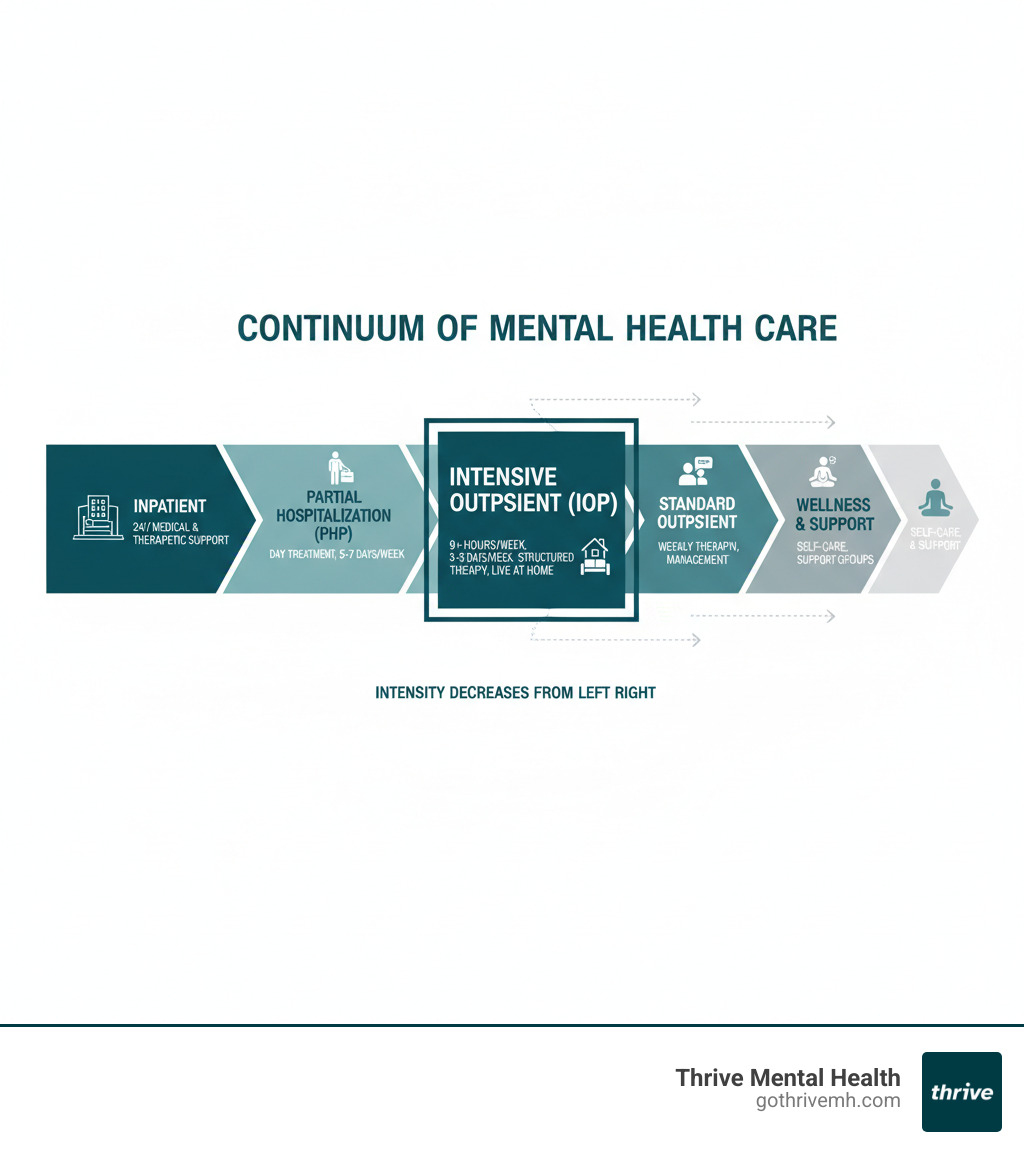Unlocking Recovery: How Intensive Outpatient Programs Deliver Results

How Do Intensive Outpatient Programs Work? Fast, Flexible Care That Fits Your Life
Your First Step to Understanding Intensive Treatment
If you are in crisis or having thoughts of self-harm, please call or text 988 to reach the Suicide & Crisis Lifeline. You are not alone.
How do intensive outpatient programs work? It’s a common question for anyone needing serious mental health support without pausing their daily life. The answer is simple: IOPs offer structured, evidence-based treatment for 9+ hours a week, allowing you to live at home and maintain your work or school schedule.
Here’s a quick overview of how IOPs work:
- Schedule: 3-hour sessions, 3-5 days per week.
- Services: Group and individual therapy, family counseling, and skills training.
- Setting: Virtual or in-person, while you live at home.
- Intensity: More support than weekly therapy, less than inpatient care.
- Focus: Proven therapies like CBT, DBT, and trauma-informed care.
Research shows IOPs can be as effective as inpatient treatment for many mental health and substance use issues. The key benefit is getting intensive support without putting your life on hold. At Thrive Mental Health, we specialize in creating flexible IOP programs that fit the lives of busy professionals and adults, because we believe quality care should work for you.

How do intensive outpatient programs work glossary:
What Exactly is an Intensive Outpatient Program (IOP)?
An Intensive Outpatient Program (IOP) is the middle ground between weekly therapy and a residential treatment facility. How do intensive outpatient programs work? They provide serious mental health support while allowing you to live at home and maintain your daily life.
An IOP is a structured treatment program offering significant therapeutic support. The “intensive” part refers to the time commitment: at least 9 hours per week for adults, usually in 3-hour sessions over 3-5 days. This intensity is designed for rapid symptom resolution and helps you build strong coping skills faster than traditional therapy. It’s a life-changing approach for challenges like depression, anxiety, PTSD, and substance use disorders.
IOPs can be a step-down from inpatient care or a step-up from weekly therapy when you need more support. At Thrive Mental Health, we help individuals get intensive care while staying connected to their work, family, and community.
More info about Intensive Outpatient Programs (IOP)
IOP vs. Other Levels of Care: Finding the Right Fit
Choosing the right level of care depends on your symptoms, safety, and daily responsibilities. Understanding where IOPs fit in the treatment spectrum is key to making an informed decision.
| Feature | Inpatient (Residential) | Partial Hospitalization (PHP) | Intensive Outpatient (IOP) | Standard Outpatient Therapy |
|---|---|---|---|---|
| Time Commitment | 24/7 supervision, living at facility | 20+ hours/week (e.g., 5 days for 4-6 hours) | 9-15 hours/week (e.g., 3-5 days for 3 hours) | 1-2 hours/week (e.g., 1-2 sessions for 50-60 mins) |
| Living Situation | Reside at the treatment facility | Live at home or in a supportive environment | Live at home or in a supportive environment | Live at home |
| Level of Supervision | Constant medical and clinical supervision | Daily structured treatment, return home evenings/weekends | Regular structured treatment, significant independence | Weekly or bi-weekly check-ins with a therapist |
| Ideal Candidate | High risk of harm, severe symptoms, needing detox | Significant impairment, stepping down from inpatient | Moderate impairment, needing more than weekly therapy, maintaining daily life | Mild to moderate symptoms, seeking ongoing support/growth |
The main difference is flexibility. Inpatient care is immersive but requires stepping away from your life. PHP offers full-day treatment while you return home at night. IOPs provide substantial support while preserving your work-life balance, allowing you to practice new skills in your real-world environment immediately.
How an IOP Differs from Standard Weekly Therapy
While valuable, weekly 50-minute therapy sessions follow a different rhythm than an IOP. An IOP accelerates healing through a few key differences:
- Time Commitment: IOPs provide 9+ hours of support per week compared to just a few hours a month in standard therapy. This creates therapeutic momentum and allows for deeper, more consistent work.
- Group Therapy Focus: Group sessions are the cornerstone of IOP. In these structured groups, you practice communication skills, gain new perspectives, and realize you’re not alone. This is a major departure from solo weekly sessions.
- Multidisciplinary Team: Instead of one therapist, you get a team that may include psychiatrists, licensed therapists, and case managers, ensuring all aspects of your well-being are addressed.
This treatment intensity often leads to faster symptom relief, with many clients seeing significant improvement in weeks, not months.
What to Expect in an Intensive Outpatient Program
How Do Intensive Outpatient Programs Work? A Look Inside the Structure
An IOP’s power lies in its structured yet flexible approach. It’s designed to deliver maximum therapeutic benefit while fitting into your life. But how do intensive outpatient programs work day-to-day?

An IOP integrates a powerful therapeutic foundation into your daily routine. You learn and practice new skills while navigating real-life stressors, making your job, family, and daily challenges part of the healing process. This approach is highly effective, with research showing IOPs are as effective as inpatient care for many.
The Typical IOP Schedule and Duration
Most IOPs run for 8 to 12 weeks, with sessions 3 to 5 days per week. Each session lasts about 3 hours, totaling 9-15 hours of treatment weekly. This consistent engagement creates therapeutic momentum.
The key is flexibility. Thrive Mental Health offers both morning and evening sessions to accommodate your career and family obligations. Whether you’re a professional in Indianapolis or a parent in California, we design a schedule that works for you, not against you.
Core Components and Therapeutic Services
An IOP is a comprehensive support system. During your weekly hours, you’ll engage in several core services:
- Group Therapy: The heart of IOP, where you connect with peers, share experiences, and practice new skills in a supportive setting.
- Individual Counseling: One-on-one sessions to process personal history, address specific trauma, and create custom coping strategies.
- Family Therapy: Sessions to help your support system understand and participate in your recovery journey.
- Psychoeducation: Workshops that teach you the ‘why’ behind your mental health symptoms, empowering you with knowledge.
- Skills-Building: Practical training in stress management, communication, and mindfulness that you can use immediately.
- Medication Management: Psychiatric oversight to ensure any prescribed medications are effective and optimized.
Explore our Virtual IOP Program
Evidence-Based Therapies That Drive Results
IOPs use therapies proven to work. We rely on research-backed approaches to ensure you get the best possible care:
- Cognitive Behavioral Therapy (CBT): Helps you identify and change negative thought patterns that keep you stuck.
- Dialectical Behavior Therapy (DBT): Teaches skills for managing intense emotions, improving relationships, and handling distress.
- Motivational Interviewing (MI): A collaborative approach that helps you find your own motivation for change.
- Trauma-Informed Care: Creates a safe space to process past trauma using methods like EMDR, reducing its impact on your present life.
These are not just theories; they are practical tools for long-term wellness.
Is an IOP Right for You? Candidates, Benefits, and Requirements
Deciding on the right treatment path is a crucial step. An IOP works best when there’s a good match between your needs and the program’s structure. A comprehensive clinical assessment is the first step to determining if it’s the right fit for you.

Who is the Ideal Candidate for an IOP?
An IOP isn’t a one-size-fits-all solution, but it can be life-changing for the right person. Ideal candidates generally have:
- Medical Stability: You don’t require medical detox or 24/7 supervision. Those at immediate risk of harm need a higher level of care first.
- Motivation to Participate: You have a willingness to engage in the therapeutic process. Active participation is key to growth.
- A Supportive Home Environment: A stable living situation is crucial, as you return home after sessions. This is important whether you’re in a major city like Phoenix or a smaller community near Fort Wayne.
IOPs are highly effective for those with depression, anxiety, PTSD, and substance use disorders. They are also ideal for individuals stepping down from residential care or stepping up from weekly therapy that isn’t providing enough support.
NAMI on who benefits from structured outpatient treatment
The Major Benefits of Choosing an IOP
Choosing an IOP provides intensive support without completely disrupting your life. The main advantages include:
- Maintain Your Daily Life: Keep your job, attend school, and care for your family while receiving treatment.
- Cost-Effectiveness: IOPs are significantly less expensive than residential treatment because they don’t include costs for room and board.
- Real-World Skill Application: You immediately apply the coping skills you learn in your actual home, work, and social environments.
- Strong Peer Support: Group sessions connect you with others who understand your struggles, creating a powerful support network.
- Family Involvement: We can integrate family therapy to help your loved ones become part of your recovery, strengthening the entire family system.
The Benefits of an Intensive Outpatient Program
How an Intensive Outpatient Program Sets You Up for Success
An effective IOP builds a foundation for long-term wellness. It equips you with tools and resilience through:
- Accountability and Structure: The regular schedule creates a predictable, healing routine and a commitment to your recovery.
- Relapse Prevention: You’ll work to identify triggers and develop a personalized plan to manage them proactively.
- Practical Coping Skills: Learn techniques for stress management and communication that apply to all areas of your life.
- Community: Build lasting bonds with peers who understand your journey and can offer ongoing support.
Understand IOP Program Requirements
Your Journey Through an IOP: From Enrollment to Long-Term Recovery
Starting an IOP is a commitment to your well-being. We guide you through every step, from finding the right program to planning for long-term success after treatment.

How to Find, Pay for, and Enroll in an IOP
Finding and starting an IOP is more manageable than you might think. Here’s the process:
- Initial Assessment: Your journey begins with a thorough clinical evaluation to review your history and goals. This helps our team confirm that an IOP is the right level of care for you.
- Verify Insurance: Most major insurance plans, including Cigna, Optum, and Florida Blue, cover IOPs. We help you verify your in-network benefits and understand any out-of-pocket costs upfront, so there are no surprises.
- Find a Program: With virtual and hybrid options, access to care is easier than ever. Thrive Mental Health serves clients across the country, with local programs available in states like Florida (Miami, Orlando, Tampa), South Carolina (Charleston), Indiana (Indianapolis), Arizona (Phoenix), and California (Los Angeles, San Diego). For other local options, the SAMHSA Treatment Locator is a great resource.
- Enrollment: Once the assessment and financial details are complete, we’ll guide you through the simple paperwork and schedule a start date that works for you.
Life After IOP: Aftercare and Ongoing Support
Completing an IOP is a new beginning, not an end. We ensure a seamless transition to set you up for lasting success with aftercare planning.
- Step-Down Programs: Many clients transition to less frequent outpatient therapy, providing a gradual return to a regular routine.
- Alumni and Support Groups: We connect you with alumni networks and community-based groups like Alcoholics Anonymous (AA) and Narcotics Anonymous (NA) for continued peer support.
- Individual Therapy: Continuing with a one-on-one therapist helps you reinforce the skills you learned and steer new challenges.
- Relapse Prevention Plan: You’ll leave with a personalized, practical roadmap that identifies triggers and outlines coping strategies for difficult moments.
Our goal is to equip you with a robust toolkit for not just surviving, but thriving.
Frequently Asked Questions about IOPs
It’s natural to have questions about how do intensive outpatient programs work in practice. Here are concise answers to the most common questions we hear.
Can you work while in an intensive outpatient program?
Yes. This is a primary benefit of IOP. Programs are designed with flexibility in mind, offering morning and evening sessions to fit around work, school, or family commitments. You can get the help you need without putting your career on hold.
How long does an IOP program usually last?
The typical IOP lasts 8 to 12 weeks, but the duration is custom to your clinical progress. During this time, you’ll attend sessions 3-5 days per week for about 3 hours each day, totaling 9+ hours of weekly treatment.
What is the difference between IOP and PHP?
A Partial Hospitalization Program (PHP) is more intensive than an IOP. PHP involves 20+ hours of treatment per week (e.g., 5 days a week for 4-6 hours), while an IOP requires 9+ hours per week. IOP offers more flexibility, making it ideal for those who need to balance treatment with daily responsibilities.
Does insurance cover intensive outpatient programs?
Yes, most major insurance plans cover IOPs, including Cigna, Optum, and Florida Blue. They are recognized as an essential, evidence-based level of care. We always recommend verifying your specific benefits, and our team can help you understand your coverage and any out-of-pocket costs upfront.
Take the Next Step Toward Healing
Understanding how do intensive outpatient programs work is the first step. Taking action is where change begins. IOPs offer a unique balance of intensive support and the flexibility to maintain your daily life, combining evidence-based therapies with real-world skill application.
At Thrive Mental Health, our virtual and hybrid programs are designed for busy adults and professionals. With expert-led care and evening options, you don’t have to choose between your responsibilities and your well-being.
Ready for support? Thrive offers virtual and hybrid IOP/PHP with evening options. Verify your insurance in 2 minutes (no obligation) → Start benefits check or call 561-203-6085. If you’re in crisis, call/text 988.